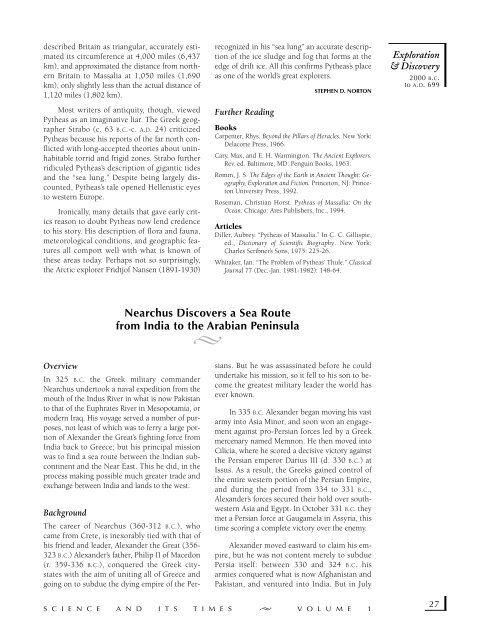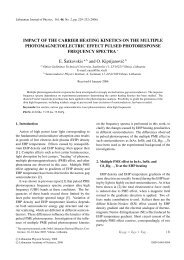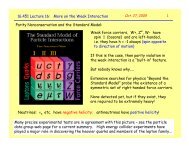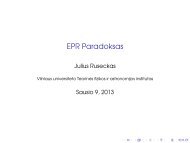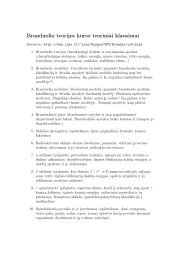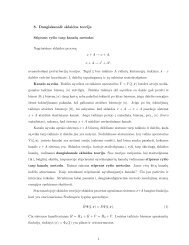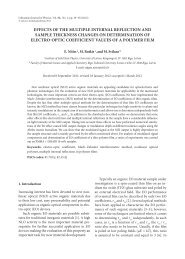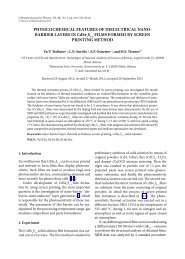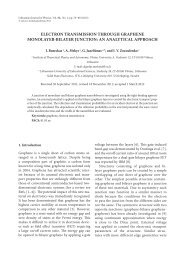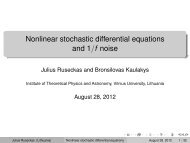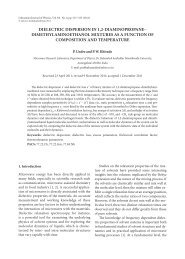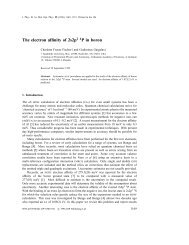Gale - Science and Its Times Vol 01 (2000 BC to AD 699).pdf
Gale - Science and Its Times Vol 01 (2000 BC to AD 699).pdf
Gale - Science and Its Times Vol 01 (2000 BC to AD 699).pdf
You also want an ePaper? Increase the reach of your titles
YUMPU automatically turns print PDFs into web optimized ePapers that Google loves.
Background<br />
The career of Nearchus (360-312 B.C.), who<br />
came from Crete, is inexorably tied with that of<br />
his friend <strong>and</strong> leader, Alex<strong>and</strong>er the Great (356-<br />
323 B.C.) Alex<strong>and</strong>er’s father, Philip II of Macedon<br />
(r. 359-336 B.C.), conquered the Greek citystates<br />
with the aim of uniting all of Greece <strong>and</strong><br />
going on <strong>to</strong> subdue the dying empire of the Perdescribed<br />
Britain as triangular, accurately estimated<br />
its circumference at 4,000 miles (6,437<br />
km), <strong>and</strong> approximated the distance from northern<br />
Britain <strong>to</strong> Massalia at 1,050 miles (1,690<br />
km), only slightly less than the actual distance of<br />
1,120 miles (1,802 km).<br />
Most writers of antiquity, though, viewed<br />
Pytheas as an imaginative liar. The Greek geographer<br />
Strabo (c. 63 B.C.-c. A.D. 24) criticized<br />
Pytheas because his reports of the far north conflicted<br />
with long-accepted theories about uninhabitable<br />
<strong>to</strong>rrid <strong>and</strong> frigid zones. Strabo further<br />
ridiculed Pytheas’s description of gigantic tides<br />
<strong>and</strong> the “sea lung.” Despite being largely discounted,<br />
Pytheas’s tale opened Hellenistic eyes<br />
<strong>to</strong> western Europe.<br />
Ironically, many details that gave early critics<br />
reason <strong>to</strong> doubt Pytheas now lend credence<br />
<strong>to</strong> his s<strong>to</strong>ry. His description of flora <strong>and</strong> fauna,<br />
meteorological conditions, <strong>and</strong> geographic features<br />
all comport well with what is known of<br />
these areas <strong>to</strong>day. Perhaps not so surprisingly,<br />
the Arctic explorer Fridtjof Nansen (1891-1930)<br />
recognized in his “sea lung” an accurate description<br />
of the ice sludge <strong>and</strong> fog that forms at the<br />
edge of drift ice. All this confirms Pytheas’s place<br />
as one of the world’s great explorers.<br />
Further Reading<br />
STEPHEN D. NORTON<br />
Books<br />
Carpenter, Rhys. Beyond the Pillars of Heracles. New York:<br />
Delacorte Press, 1966.<br />
Cary, Max, <strong>and</strong> E. H. Warming<strong>to</strong>n. The Ancient Explorers.<br />
Rev. ed. Baltimore, MD: Penguin Books, 1963.<br />
Romm, J. S. The Edges of the Earth in Ancient Thought: Geography,<br />
Exploration <strong>and</strong> Fiction. Prince<strong>to</strong>n, NJ: Prince<strong>to</strong>n<br />
University Press, 1992.<br />
Roseman, Christian Horst. Pytheas of Massalia: On the<br />
Ocean. Chicago: Ares Publishers, Inc., 1994.<br />
Articles<br />
Diller, Aubrey. “Pytheas of Massalia.” In C. C. Gillispie,<br />
ed., Dictionary of Scientific Biography. New York:<br />
Charles Scribner’s Sons, 1975: 225-26.<br />
Whitaker, Ian. “The Problem of Pytheas’ Thule.” Classical<br />
Journal 77 (Dec.-Jan. 1981-1982): 148-64.<br />
Exploration<br />
& Discovery<br />
<strong>2000</strong> B.C.<br />
<strong>to</strong> A.D. <strong>699</strong><br />
Nearchus Discovers a Sea Route<br />
from India <strong>to</strong> the Arabian Peninsula<br />
<br />
Overview<br />
In 325 B.C. the Greek military comm<strong>and</strong>er<br />
Nearchus under<strong>to</strong>ok a naval expedition from the<br />
mouth of the Indus River in what is now Pakistan<br />
<strong>to</strong> that of the Euphrates River in Mesopotamia, or<br />
modern Iraq. His voyage served a number of purposes,<br />
not least of which was <strong>to</strong> ferry a large portion<br />
of Alex<strong>and</strong>er the Great’s fighting force from<br />
India back <strong>to</strong> Greece; but his principal mission<br />
was <strong>to</strong> find a sea route between the Indian subcontinent<br />
<strong>and</strong> the Near East. This he did, in the<br />
process making possible much greater trade <strong>and</strong><br />
exchange between India <strong>and</strong> l<strong>and</strong>s <strong>to</strong> the west.<br />
sians. But he was assassinated before he could<br />
undertake his mission, so it fell <strong>to</strong> his son <strong>to</strong> become<br />
the greatest military leader the world has<br />
ever known.<br />
In 335 B.C. Alex<strong>and</strong>er began moving his vast<br />
army in<strong>to</strong> Asia Minor, <strong>and</strong> soon won an engagement<br />
against pro-Persian forces led by a Greek<br />
mercenary named Memnon. He then moved in<strong>to</strong><br />
Cilicia, where he scored a decisive vic<strong>to</strong>ry against<br />
the Persian emperor Darius III (d. 330 B.C.) at<br />
Issus. As a result, the Greeks gained control of<br />
the entire western portion of the Persian Empire,<br />
<strong>and</strong> during the period from 334 <strong>to</strong> 331 B.C.,<br />
Alex<strong>and</strong>er’s forces secured their hold over southwestern<br />
Asia <strong>and</strong> Egypt. In Oc<strong>to</strong>ber 331 B.C. they<br />
met a Persian force at Gaugamela in Assyria, this<br />
time scoring a complete vic<strong>to</strong>ry over the enemy.<br />
Alex<strong>and</strong>er moved eastward <strong>to</strong> claim his empire,<br />
but he was not content merely <strong>to</strong> subdue<br />
Persia itself: between 330 <strong>and</strong> 324 B.C. his<br />
armies conquered what is now Afghanistan <strong>and</strong><br />
Pakistan, <strong>and</strong> ventured in<strong>to</strong> India. But in July<br />
S C I E N C E A N D I T S T I M E S V O L U M E 1<br />
27


